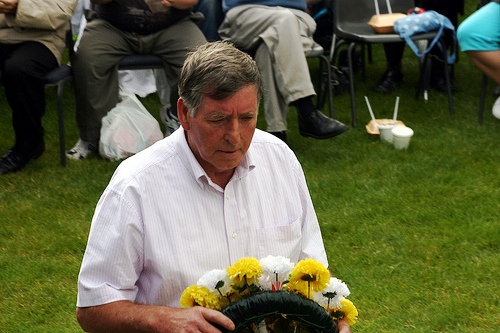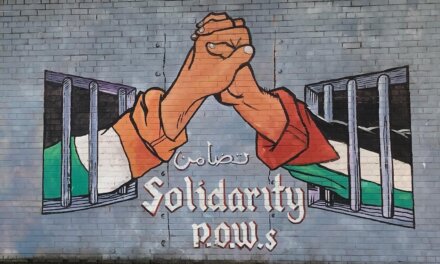Sunday’s march, the culmination of a weekend of events organised to mark the 28th anniversary of the H-Block fast, saw as many as 10,000 people join with representatives of the families of the hunger strikers as they marched through Galbally, the birthplace of Martin Hurson, to a rally at the Galbally Pearse’S GAC.
The many banners that were carried along the three mile route were a colourful display of solidarity and a geographical pointer to the fact that people had travelled the length and breadth of Ireland to attend the march.
From Tyrone there were banners from Brantry, Eglish, Kileeshill, Loughmacrory and Killyclogher. Then there were the banners, from Wexford, Dublin and Monaghan.
Republican flute bands travelled from Dungiven, Belfast, Strabane, Armagh, Antrim and they all beat out their defiance, to the delight of the crowds.
The bands from Scotland were a welcome addition. They are proud republicans who still face the rigours of a sectarian and racist Scottish establishment as they play their part in the struggle for a united Ireland.
The lines of former POWs, wearing their ‘black and whites’, represented every county in the Six Counties. They were joined by many more who came from further afield, all bringing their own memories of the prison struggle. The former H-Block prisoners reminisced about Bobby, Francie, Ray McCreesh, Patsy, Big Joe, Hurson Boy, Big Doc, Kevin ‘Barabbas’ Lynch, Big Tom and Red Mick. But prison struggle was not confined to the H-Blocks. The many faces in the crowd of women who had fought the injustice and brutality of strip searching in Armagh and Maghaberry and the men who were gassed by the British army using highly toxic CR gas in 1974, all stood firm against successive British regimes whose aim was to criminalise the republican struggle.
There were prisoners who spent many years in prison in England who were at Sunday’s march, POWs who were isolated in Special Secure Units (SSUs), who refused to be broken or criminalised. On reaching Galbally the huge crowd was addressed by the Sinn Féin President Gerry Adams who said that Sinn Féin are not in the business of electoral politics for the sake of it but to bring about real change for the better in the lives of citizens.
“The republican struggle was not and is not about bums on seats in the Executive or Parliament Buildings or Leinster House or the EU or any other forum just for the sake of it! Our representatives know this. They are about delivering. They are about using the political strength we have vested in them to deliver the rights and entitlements of citizens and to achieve our republican objectives. We are not in the business of electoral politics for the sake of it but to use the political mandate we receive to bring about real change for the better in the lives of citizens.
“Activism for Irish republicans means being firmly rooted and active in our local community; relevant in the work that we do; and republican in our politics and motivation. Republican politics are about the national and the social: the national and the local. In simple terms our objectives are about a better Ireland, a reunited Ireland, a new inclusive society – and a new national Republic based on equality, freedom and justice.
“There are a number of prongs to our activism and to our strategy. One is about bedding down the peace process. This means completing the implementation of the Good Friday Agreement; on the transfer of powers on policing and justice; on a Bill of Rights and on Acht na Gaeilge. It also means tackling disadvantage and poverty and injustice and delivering effective government. And it’s also about reaching out to and engaging with unionism at all levels; community, church, political, the orange order, the working class and middle class.
“We who want a United Ireland must be prepared to persuade those who don’t of the merits of our position. While all this is a huge challenge in many ways the work we do in the South is just as difficult.
“Since 1927 the politics of the southern state has been dominated by the two big conservative parties, Fianna Fáil and Fine Gael. The reality is that it is only in recent years that Sinn Féin has been able to seriously take on the task of building a long term political strategy in the south. It is a slow process but republicans are about changing political conditions so that citizens are empowered to make their lives better, to reclaim their rights.
“The Irish government purports to be republican. There is nothing republican about its policies. It is not about equality or citizens rights. It is a bad government, taking bad decisions, in the interests of its money lender friends in the banks and among the developers.
“The decisions that have been taken so far and the decisions likely to emerge out of the McCarthy Report and in the budget later this year, amount to an attack on the most vulnerable and disadvantaged in society. Instead of taxing the wealthy the Irish government is slashing public services and jobs and beating up on the unemployed, the elderly, the children and the sick.
“There is an urgent need to build opposition to the coalition government, and to the conservative forces in the state. They cannot be allowed to destroy the social fabric of Irish society. Our responsibility is to make republicanism relevant to our time by bringing forward commonsense and practical solutions to the chaos the conservative parties have caused.
“What is needed is a new politics delivering and implementing new policies that protect jobs, create new jobs, invest in public services and remove the threat of homelessness from tens of thousands of families.
“There are lots of potential allies out there. The prison protests in Armagh and the H-Blocks brought together many people who disagreed on other issues. The hunger strikes became a catalyst for a huge mass movement.
“In dire economic times, not dissimilar to today, prison candidates including Martin Hurson, received substantial votes and two prisoners were elected TDs. So while building Sinn Féin, we also have to help build an alliance for change. We have to come together with others to forge a stronger, united progressive and democratic movement for our country – one that aims to meet the needs of all citizens.
“Just as we did in that long hard summer of 1981. I believe that this can be done.”




